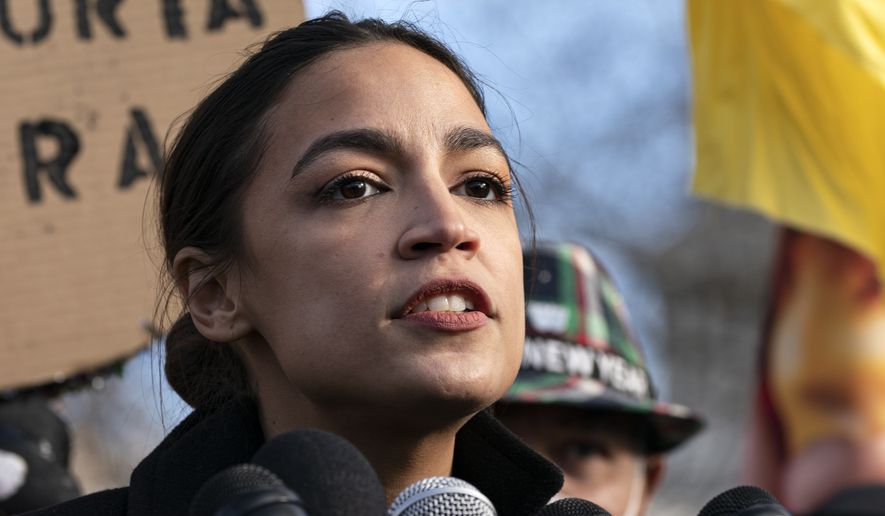Moderate Democrats are warning that their party is headed in a dangerous direction with far-left primary challengers trying to purge centrists from Congress.
The New Democrat Coalition — which boasts 98 members or nearly half of House Democrats — issued a plea to grow the party from the center as the group marked 25 years in Congress.
“A strong center is the key to our governing majority and our battleground members are an important line of defense against extremist control of Congress,” said Rep. Ann M. Kuster, a New Hampshire Democrat and the New Democrats’ vice chair for communications. “As we look ahead, we must continue to embrace the growth of moderate members.”
Centrist Democrats are most at risk of losing their seats in the midterms with both Republicans and far-left Democrats going after them.
Far-left or progressive candidates flexed their muscles in the last round of primary elections.
Rep. Kurt Schrader, a member of the New Democrat and more conservative Blue Dog Coalition, is poised to lose his race against liberal challenger Jamie McLeod-Skinner by double digits when the last of the votes are counted.
Summer Lee, a liberal candidate backed by far-left political action committee Justice Democrats, is closing in on a victory in the newly created 12th Congressional District in central Pennsylvania.
Pennsylvania Lt. Gov. John Fetterman, the most liberal candidate for the state’s open Senate seat, won the Democratic primary and defeated Rep. Conor Lamb.
Progressive firebrand Rep. Alexandria Ocasio-Cortez, New York Democrat, celebrated the strong showing of her left-wing compatriots in the primaries.
“It’s remarkable and it’s very powerful,” Ms. Ocasio-Cortez told The Washington Times. “What we saw was a rebuke of Democratic voters against the lack of progress by moderate obstructionists like Joe Manchin.”
Rep. Ro Khanna, a California Democrat and member of the Congressional Progressive Caucus, also cheered the fall of centrist incumbents, like Mr. Schrader.
“[Schrader’s race] signals that you can’t sabotage the president’s agenda and not expect a reaction from voters,” Mr. Khanna said. “It’s a big warning sign for someone like Kyrsten Sinema.”
Ms. Sinema, a senator from Arizona, isn’t up for reelection until 2024, but progressives have already made her a target for a primary challenge. She’s on the far-left’s list because she objected to President Biden’s massive spending plans and refused to back proposals to blow up Senate filibuster rules.
The party’s more moderate Congress members say the far left is alienating the rest of the party and endangering incumbents across the board.
“There are three people who want to defund the police, but almost nobody does,” said Rep. Scott Peters, California Democrat. “That’s overhyped and I don’t think it’s very many people.”
Rep. Cheri Bustos, Illinois Democrat who will retire this year, said far-left victories in swing districts could backfire and give Republicans an edge in the general election.
“If somebody far left is elected in a Republican-leaning district, it’s very, very hard to win in the general,” she said. “So, if you have far-left candidates coming out of primaries in a Republican-leaning district, that makes it very difficult, especially in the midterms when history doesn’t show that it’s on our side. Who comes out of the primaries is really important.”
Democrats have also been split on backing incumbents versus primary challengers.
Rep. Pramila Jayapal, chair of the Progressive Caucus, endorsed Texas Rep. Henry Cuellar’s liberal primary challenger Jessica Cisneros, bucking party leadership.
Ms. Jayapal cited Mr. Cuellar’s anti-abortion stance as her reasoning to endorse Ms. Cisneros, who narrowly lost to the congressman in 2020.
Rep. Hakeem Jeffries of New York, chair of the House Democratic Caucus, said he will continue to support incumbents in tough primary match-ups.
“Several of us have explicitly supported members like Shontel Brown, and we were very delighted to see that she won and won in decisive fashion. We will continue to support highly effective members of Congress moving forward like Dina Titus and Don Payne, as well as those who are facing particular challenges in their respective districts,” Mr. Jeffries said.
Mr. Jeffries denied intraparty friction and the rise of primary fights diminishes the Democratic Party’s reputation for being a big tent for ideological diversity.
“The party will always be a big tent party,” he said.
• Mica Soellner can be reached at msoellner@washingtontimes.com.




Please read our comment policy before commenting.